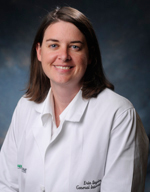Takeaway
Listening and understanding is what leads to true patient partnership, which is what is going to lead to true health.

Connecting with Patients | May 6, 2019 | 3 min read
By Erin Snyder, MD, University of Alabama School of Medicine
When I first met her, Mrs. G was in the Cardiac Intensive Care Unit, and I was her primary care doctor. She was intubated, on pressors and inotropes, in acute cardiogenic shock. Mrs. G had developed depression so severe that she had retreated inside her own head – she was catatonic.
Life threatening depression
During her inpatient psychiatric hospitalization, she received medicines and, eventually, electroshock therapy. She was immobile for long enough that she developed a clot in her leg that eventually became a massive saddle pulmonary embolism. This strain on her circulatory system lead to heart failure and cardiogenic shock. She had not attempted suicide, but her depression was threatening her life, nonetheless.
Coming back to life
With intensive medical care, she recovered. Her depression waned, as did her heart failure. It was like she came back to life. I had the joy of building a relationship with her over many years. She was full of light and hope, with no sign of someone who had been so ill with depression that she couldn’t move.
Through the years, her cardiac function improved, and we were able to stop most of the heart failure medicines. We stopped the anticoagulation after she had some minor bleeding. She visited a psychiatrist regularly for a time, and eventually these visits fell by the wayside as well. She was briefly on an atypical antipsychotic, but as she improved, we stopped this too. She was active in her community, went to dance class every week, and took care of her young grandchildren after school. She was better.
But one medicine remained, her antidepressant…
It didn’t seem to be causing any harm, and I vividly remembered how withdrawn she had been. The memory of that depression still loomed large in my mind, far more than the heart failure. She began asking about stopping it, and we tapered, but I never felt ready to suggest removing this medicine all together.
One day, at a regular appointment, Mrs. G brought a folded piece of paper. She handed me a poem, dedicated to her antidepressant. She had stopped it herself, perhaps sensing my hesitation to give her “permission.” She felt great off of this medicine.
I could not hear my patient
Depression is a chronic illness, but in my fear of relapse, I never considered remission. She didn’t need the antidepressant any more than she needed the digoxin. In fact, she was having side effects from the antidepressant, but I didn’t hear them, maybe I didn’t really ask for them. I aim to practice patient centered care, to focus on the patient’s goals, not mine, and to form a true partnership in diagnosis and treatment planning. And I have to admit, I pat myself on the back for this “enlightened” practice style. But my bias, my fear, got in the way of listening for her goals and needs. I was the barrier to moving forward. Eventually, she found a way to tell me, and she moved herself forward alone.
A poem from my patient.
I keep the poem tacked up by my desk. It is a reminder to check my own fears and concerns and focus on the patient’s goals. Only together will we find the right way forward. Without listening, without actively naming my potential bias, my perspective drives the course of treatment with patients. Listening and understanding is what leads to true partnership, and the true partnership is what is going to lead to true health.
Here is the poem my patient brought on a folded piece of paper years ago:
The Pill
I don’t need a pill messing with my head.
All I need is a little more Jesus. He will take care of me.
One less pill to swallow.
Every morning my clock radio woke me up,
But now I am able, with the help of God,
To get up on my own.
Mama, I am back.
I can see clearly now, the pill is gone.

